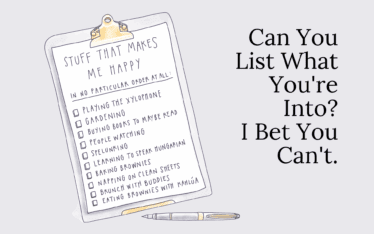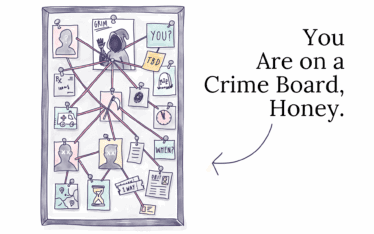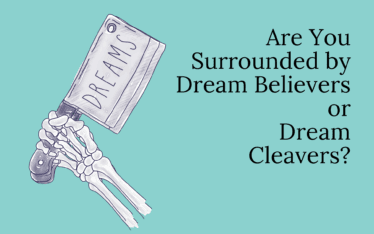Tell the truth: you underestimate the well-being impact of the great outdoors, right? You might think being outside is nice, but not necessary, like appetizers — we all love them, but the entrée is usually enough. (The entrée plus dessert is enough, to be clear.) You’re not alone; research shows that we systematically underestimate the feel-good effects that nature delivers, so we find ourselves all holed up inside, missing out on the goodness that mother nature has to offer.
Exactly how much are we missing out? Experts tell us we spend 87% of our time indoors and another 6% of our time driving around in vehicles — so 93% of the time we’re cooped up inside and wondering why we’re slowing losing our minds.
Even for a homebody like me, with a large amount of fear and disdain for All Things Outside (spiders, chilly breezes, mosquitoes, no Netflix, dirt, and did I mention spiders?), I recognize the restorative power that a little green time can provide. Whether you’re already sold on nature or need a little brainwashing, read on to find out how not being inside can help us like our lives so much more.
9 ½ pieces of proof that nature is the path to happiness:
- Nature hikes our feelings of being vitality alive. One study led participants on a 15-minute walk along a tree-lined river path, while a different set of unlucky participants were led on a 15-minute walk through underground tunnels. Shockingly, the results indicated that people don’t like sketchy, subterranean passages all that much. The participants who walked outdoors rated themselves higher on subjective vitality than before their sojourn, whereas the tunnel walkers experienced no such jump in feeling vitally alive. Another study showed images of nature scenes or images of buildings and roads to participants for two minutes per picture. People in the nature group reported an increase in vitality, whereas those who looked at pictures of city streets and buildings experienced a zapping of vitality.
- Surrounding your indoor spaces with plants is a sneakily effective way to reap the benefits of nature; one study found that participants sitting in a plant-filled lab setting were more generous, and also likelier to tap into intrinsic values rather than extrinsic ones (so the city cues us to value things like fame and fortune, whereas the country — or a room with a bunch of ferns — sparks values like community and relationships).
- Exposure to nature made study participants more cooperative and likely to demonstrate environmentally sustainable behavior.
- Nature delivers more than just jacked-up vitality; studies have also demonstrated that connectedness to nature positively correlates with meaningfulness in life, so the more we’re affiliated with the flora and fauna of the outside world, the greater our sense that we have a purpose on the planet is and the more fulfilled we tend to be.
- Researchers in Japan have shown how Shinrin-yoku (forest bathing) can favorably impact our responses to stress. Immersing ourselves in the elements of nature — like the sound of running water or the feel of wood in the forest can lower our pulse rate, blood pressure, concentrations of cortisol, and overall anxiety.
- “Green exercise” (outdoors + exercise = green exercise… cute, right?) has also been shown to be better for us than exercising indoors (and purportedly way better than not exercising at all and eating Häagen-Dazs out of the container on the couch). Walking outdoors, for example, had a positive impact on mood for study participants (subjective vitality, self-esteem, calmness, tranquility, and other great words), as compared to those who walked indoors. Being outside encourages us to move our bodies — because it’s hard to be outside and sit the entire time. (A girl can try.)
- One longitudinal analysis highlighted the relationship between psychological health and living near green spaces: living in an urban area with more green space leads to lower mental distress and higher well-being. (Anyone else live in a concrete jungle like me? We’re fucked.)
- Being in nature often sparks the emotion of awe, which is a burgeoning heavy hitter in the well-being world. Studies show that participation in awe-inspiring activities (such as whitewater rafting) can elevate our sense of well-being for a week or more beyond such jaw-dropping experiences.
- Doctors in at least 34 states are prescribing “nature prescriptions” for people to decrease stress, anxiety, high blood pressure, and depression. Getting outside is a great alternative to a Xanax, perhaps?
- Random but fun study: women find men more attractive and are likelier to say yes to a date request from a man if flowers are nearby. News you can use here at Four Thousand Mondays… always news you can use.
How can you become more biophilic?
Word to the wise: biophilia refers to our human desire to be close to or connected with nature and living things.
- Build outside time into your days. How much is enough? Researchers promote 120 minutes a week as a threshold for health and well-being gains. This sound enormous upfront but after a handy moment with the calculator, it’s only 17 minutes a day. Can you walk for 10 minutes around the park and then sit for 7 minutes on a bench, looking at the birds, trees, clouds, and Slurpee cups littered all around? One of my clients in Manhattan takes her dog on a walk through pure chaos until she gets to the park — at which point she can meander, sit, breathe, and slow down. Even that little slice of nature centers her, and she returns home to the rest of her workday with a new lease on life.
- Deal with the 4th pandemic wave productively. Research after the first year of Covid found that outdoor activity spiked, as we clamored to make sense of the tumultuous times and reconnect with nature in doing so. Running, cycling, hiking, camping, golfing, fishing, and bird watching all soared through the initial waves. (Also, there’s the stir-crazy factor. Some of us just had to get out of the house to not have things end up like The Shining, and outside was the only place to escape.) As restrictions tighten up again, how can you commit to an outdoor activity or hobby to offset the feelings of being masked up and locked down?
- Get social outside. Find an outdoor-loving friend who can take you under their wing; ask to join them on their next hike or whatever they do outdoors that doesn’t repulse you. You could hire a guide or join a group to engage in a new outdoorsy activity, rather than sitting at home wondering what it’s like to go birding on the other side of your window. Who do you know to call on for a double-well-being-whammy of both a social + nature fix?
- Build outdoors habits. Go for a morning walk before work… eat lunch outside… always opt for the patio at a restaurant… make an afternoon-smoothie-on-a-park-bench routine… host outdoor meetings with your teammates… build a hike into every vacation… get out in the garden before dinner every night… make every Saturday a “necessary nature” day with your family and rotate who picks the outdoor activity… obviously not all of those on the same day/ week (unless you want to, and if so, go, Girl Scout!). What little habits can you make automatic so you spend even 4% more of your day outside?
Now that we know all the facts about how good nature can be for our well-being, we’re technically shortchanging our happiness every time we make a decision to be inside instead of outside. (I’m cringing as I look at a spider web out the window. WHY CAN’T THE INDOORS BE GOOD FOR US, DAMMIT??)
We don’t have to go deep into the wilderness or go all Bear Grylls to benefit from what nature has to offer. With 17 minutes a day, we can do this. And with YouTube videos of birds eating and chirping in the woods, we can get a cheap and cheerful fix in an otherwise busy day without ever having to step outside.
And I will leave you with a snippet of the great outdoorsman Henry David Thoreau, who always says it best: “I went to the woods because I wished to live deliberately, to front only the essential facts of life, and see if I could not learn what it had to teach, and not, when I came to die, discover that I had not lived.”







